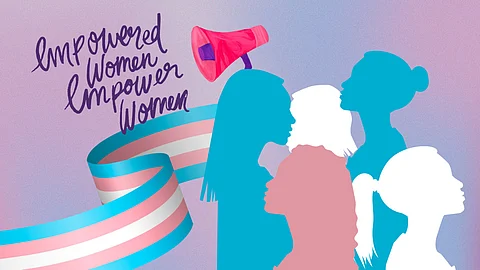
- NEWS
- the EDIT
- COMMENTARY
- BUSINESS
- LIFE
- SHOW
- ACTION
- GLOBAL GOALS
- SNAPS
- DYARYO TIRADA
- MORE

Women's Month is a time to honor the contributions, struggles, and achievements of women throughout history. As society evolves and our understanding of gender expands, discussions have arisen about whether transgender women should be included in this month-long recognition.
Recently, Filipinos on social media have actively debated this issue. Some advocate for inclusivity, arguing that Women's Month should celebrate all individuals who identify as women, regardless of their assigned sex at birth.
Supporters emphasize that trans women face many of the same forms of gender-based oppression as cisgender women, including violence, workplace discrimination, and limited access to healthcare.
For instance, trans women may face difficulties securing employment due to stigma, often being pushed into unsafe or unstable work environments. They also experience heightened risks of violence, including hate crimes and intimate partner abuse, which are similar to the challenges faced by cisgender women.
Advocates argue that excluding trans women from Women’s Month reinforces an outdated definition of womanhood that does not reflect a modern, progressive view of gender.
They emphasize that this month should focus not on drawing boundaries between cis and trans women, but on dismantling patriarchal systems that oppress all individuals who identify as women.
Meanwhile, some believe that the observance should remain centered on biological women, emphasizing historical struggles rooted in sex-based oppression. They argue that trans women have their own space for recognition, particularly during Pride Month in June.
For these individuals, Women’s Month is a tribute to generations of women who have fought against systemic oppression based on their sex. They believe that shifting the focus to include trans women risks overlooking the unique hardships faced by cisgender women.
They argue that recognition should be exclusive to what they call "real women" — those who have experienced the physical, social, and biological realities of womanhood.
For them, Women’s Month should honor the battles unique to those born female, such as reproductive rights, menstruation stigma, pregnancy discrimination, and gender-based violence.
The ongoing discourse highlights that while the Philippines has made progress in recognizing the LGBTQIA+ community, it often stops at mere acknowledgment instead of actively advocating for their rights and amplifying their voices.
It also underscores the deeply ingrained misogynistic mindset that has persisted in the country for generations, making it difficult to erase.
The Philippines has yet to pass a national anti-discrimination law explicitly protecting LGBTQ+ individuals, leaving many trans women vulnerable to workplace bias, healthcare discrimination, and even violence.
Despite differing opinions, one thing remains clear this Women’s Month: it should be a time of unity rather than division.
Including trans women in Women’s Month does not mean that cis women are celebrated less.
Ultimately, regardless of where one stands on the issue, the focus should remain on uplifting all women and advocating for their rights, dignity, and equality.
